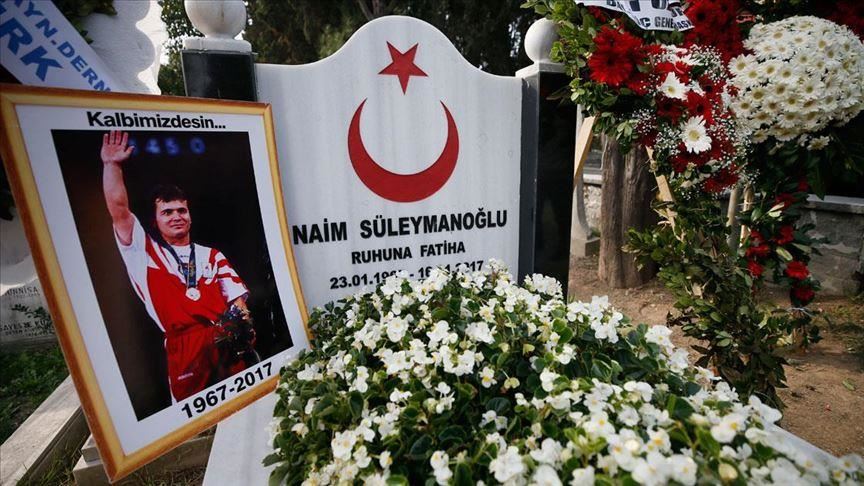
ANKARA
Turkey commemorated weightlifting legend Naim Suleymanoglu, a triple Olympic gold medal winner who died on Nov. 18, 2017.
This year marked two years since the death of the Bulgarian-born Suleymanoglu, who died of liver failure at the age of 50 after being admitted to an Istanbul hospital for liver transplant on Oct. 6, 2017.
Nicknamed "Pocket Hercules" for his 1.47 meters (4 feet 10 inches) frame, Suleymanoglu went down in weightlifting history, winning gold medals in three consecutive Olympic games: Seoul 1988, Barcelona 1992 and Atlanta 1996.
Suleymanoglu was the first weightlifter to bag gold medals at three different Olympic Games.
"He dominated the sport for over a decade and by the time he finished his career, he had set an astonishing 46 world records," according to the Olympic website.
He became an important sports figure over his hat-trick in Seoul, Barcelona and Atlanta.
Born Naim Suleimanov with Turkish roots in the southern Bulgarian province of Kardzhali in 1967, Suleymanoglu set a lifting record of 190 kilograms (419 pounds) in the clean and jerk in the 1988 Olympics.
Although Suleymanoglu set his first world record when he was 16, he could not enter the the 1984 Olympics, when Bulgaria joined the Soviet boycott of the Los Angeles games.
He was competing for Bulgaria at that time.
In 1984, 1985 and 1986, Suleymanoglu was picked as the world's best weightlifter.
In 1992, he was named the best athlete on the globe by the International Weightlifting Federation (IWF) Media Commission.
Escape to Turkey
In 1986, he took shelter in the Turkish Embassy in Australia after the Weightlifting World Cup in Melbourne, seeking to escape pressures in Bulgaria.
The 1980s witnessed Bulgarian oppression against the country's Turkish minority, forcing them to adopt Slavic names and prohibiting their language, with Suleymanoglu defected to Turkey in protest.
The Communist regime in Bulgaria forced Turks to run away to the neighboring Turkey.
It was in this period that the Bulgarian government changed Suleymanoglu's name -- without his consent -- to Naum Shalamanov.
Suleymanoglu was airlifted to Turkey's capital Ankara from Australia by Turkish Prime Minister Turgut Ozal in a secret operation.
Once the World Cup in Melbourne ended, Suleymanoglu risked his life but managed to escape from the Bulgaria camp with the help of the Turkish government.
He took a Turkish jet to fly to London first, and then to Ankara.
The Turkish government paid Bulgaria $1 million to make Suleymanoglu compete for Turkey in the 1988 Olympics, as Bulgaria allowed him to represent Turkey in international competitions.
Appearing on Time cover page
The world-renowned Time magazine put Suleymanoglu on the cover of its Jan. 3, 1988 issue after his success in the 1988 Olympics.
Suleymanoglu's medal-galore career ended in 2000 as he claimed seven World and European Championships each as well as 46 world records.
In 2000 and 2004, he was elected to the International Weightlifting Federation Hall of Fame.
He was awarded the Olympic Order, the highest award of the Olympic movement, in 2001.
On Nov. 19, 2017, Suleymanoglu was buried in Istanbul's Edirnekapi Martyr's Cemetery, located in the European part of the city.
His biggest rival from Greece, Valerios Leonidis attended Suleymanoglu's funeral.
Suleymanoglu's story in film
The biography of Suleymanoglu was filmed and will be released on Nov. 22 in Turkey.
A Turkish-Dutch actor, Hayat Van Eck, 19, is the protagonist of the drama movie "Cep Herkülü (Pocket Hercules): Naim Süleymanoğlu", portraying the Turkish weightlifting legend.
Anadolu Agency website contains only a portion of the news stories offered to subscribers in the AA News Broadcasting System (HAS), and in summarized form. Please contact us for subscription options.





